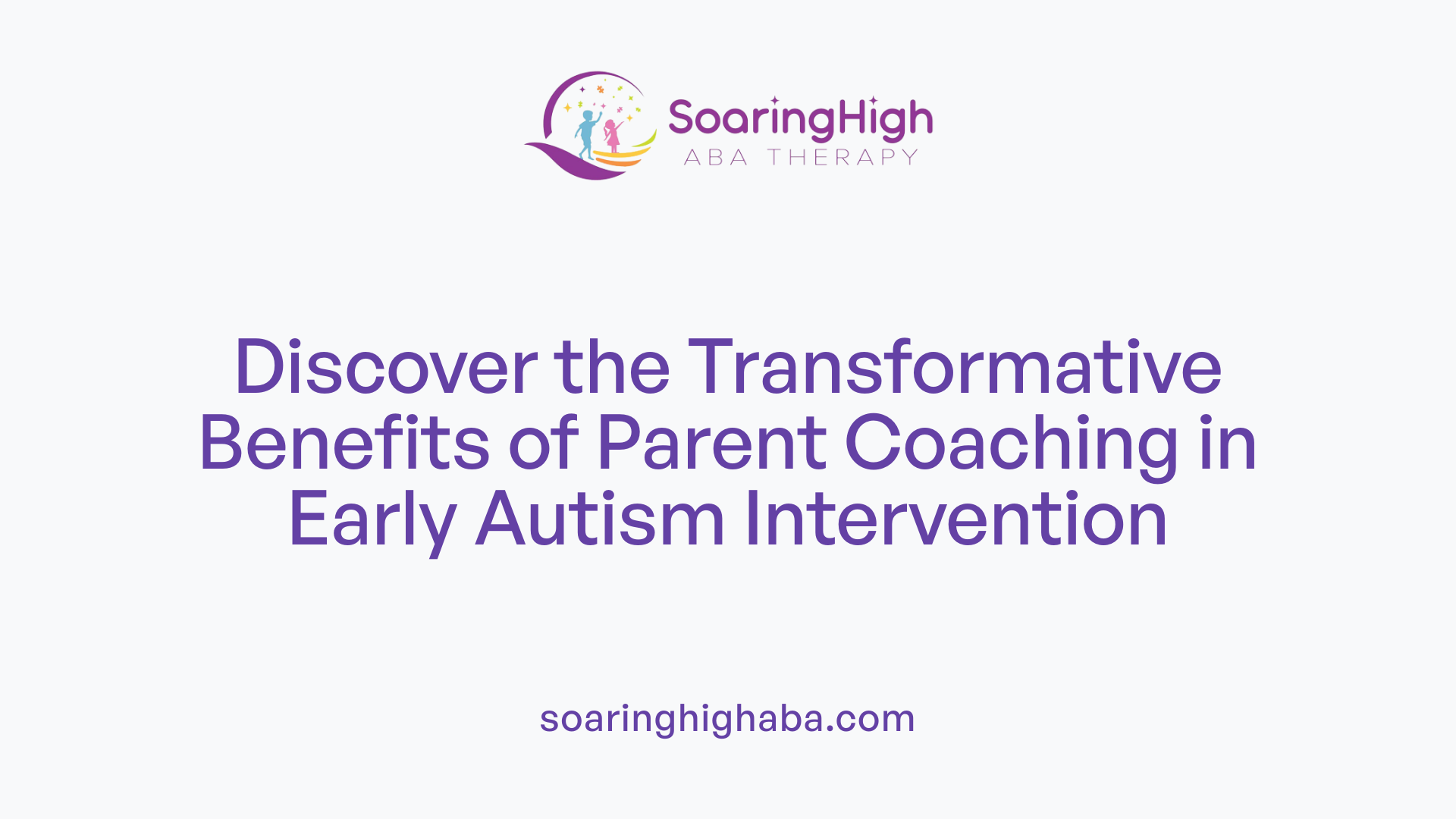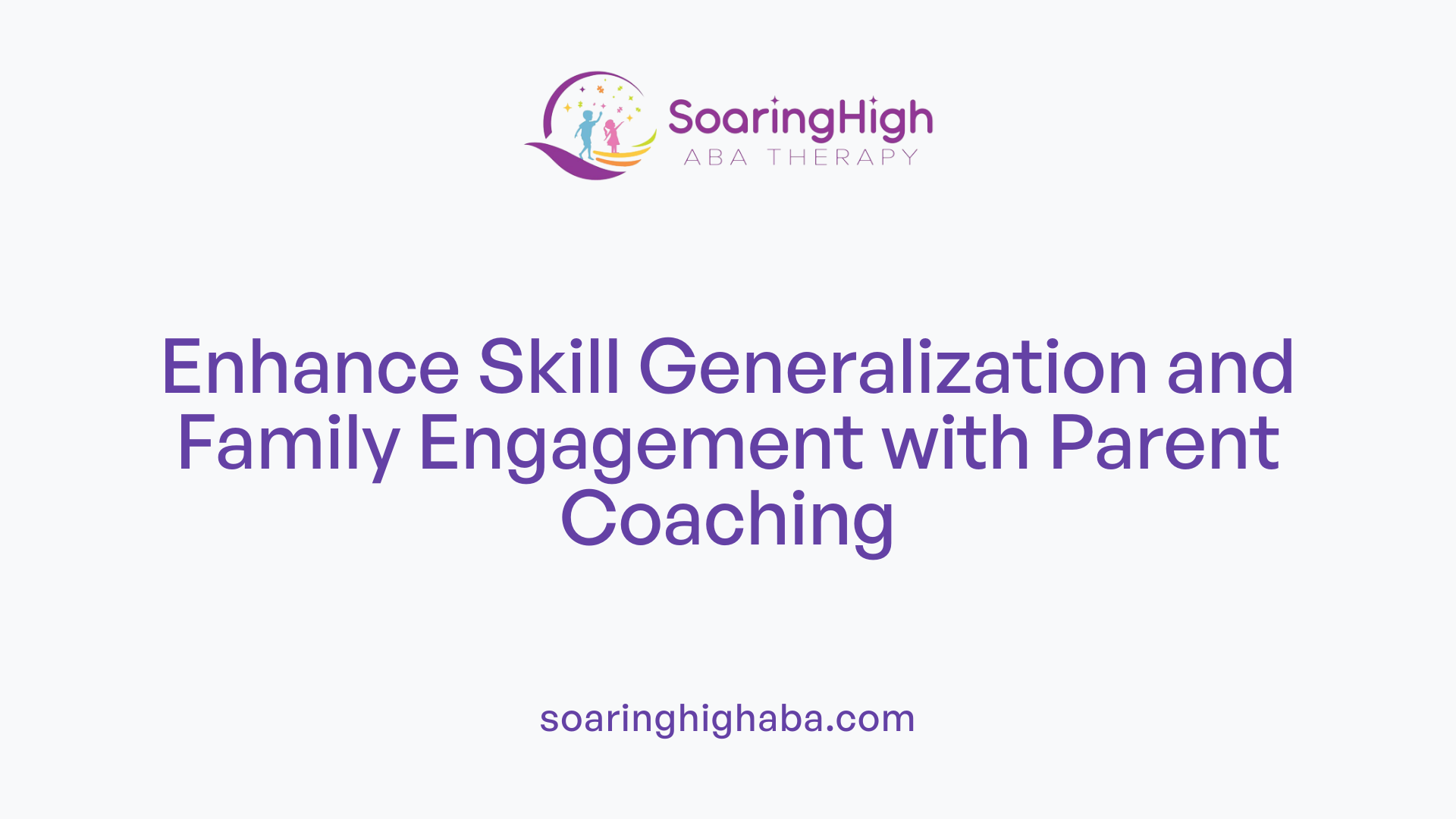The Critical Role of Parent Coaching in Enhancing ABA Therapy
In recent years, the integration of parent coaching programs within ABA therapy has gained significant attention for their potential to improve treatment outcomes for children with autism spectrum disorder (ASD). By actively involving parents in their child's intervention, these programs foster skill generalization, increase the efficiency of therapy, and strengthen the parent-child relationship. This article explores how parent coaching complements ABA therapy, the strategies behind effective programs, supported research findings, and the long-term benefits for children and families.
The Benefits of Integrating Parent Coaching into Early Autism Intervention

What are the benefits of integrating parent coaching into early autism intervention?
Incorporating parent coaching into early intervention programs for children with Autism Spectrum Disorder (ASD) has proven to be highly advantageous. One of the primary benefits is the enhancement of skill generalization. When parents are trained to implement intervention techniques at home and in various settings, children are more likely to transfer learned skills across different environments, leading to more consistent developmental progress.
Parental involvement is significantly increased through coaching. This collaborative approach fosters a strong partnership between parents and therapists, ensuring that intervention strategies are tailored to each child's unique needs. Evidence-based programs like Project ImPACT illustrate that parent-mediated strategies can effectively improve social, communication, and adaptive skills in children with ASD.
Furthermore, parent coaching empowers families by providing them with crucial knowledge and practical skills. As parents learn to apply techniques confidently, they become more active participants in their child's development, which often results in better treatment outcomes.
However, despite these benefits, implementing parent coaching widely in community settings presents challenges. Securing consistent and ongoing coaching can be difficult due to resource limitations and varying levels of community support. Ongoing effort is necessary to overcome these obstacles and ensure every child and family benefits fully from early parental coaching.
Overall, integrating parent coaching into early intervention fosters not only skill development but also strengthens the family unit, making the process more responsive and personalized for each child's developmental journey.
How Parent Coaching Enhances ABA Therapy Outcomes

How can parent coaching programs enhance the effectiveness of ABA therapy?
Parent coaching programs play a crucial role in boosting the success of ABA therapy for children with autism spectrum disorder (ASD). By training parents in evidence-based techniques, these programs empower them to consistently apply learned strategies at home and in everyday life. This steady reinforcement helps children acquire new skills more quickly and maintains those skills over time.
Parents learn to use reinforcement, prompting, shaping, and other ABA methods correctly, which leads to better outcomes. When parents are actively involved, they gain a clearer understanding of their child's needs and progress, building stronger communication and emotional bonds.
In addition, coaching helps parents adapt strategies to fit their unique circumstances, making intervention more tailored and effective. This consistency across different environments encourages children to generalize skills beyond therapy sessions — such as in school, community, or home settings.
Research shows that parental training not only improves children's behavioral and developmental achievements but also enhances parental confidence and reduces stress. Overall, parent coaching creates a collaborative, continuous support system that maximizes the impact of ABA therapy, fostering sustainable progress and long-lasting improvements.
Parent Coaching as a Catalyst for Improved Treatment Results
How does parent coaching contribute to improving treatment outcomes for children with autism?
Parent coaching plays a crucial role in enhancing the effectiveness of interventions for children with autism spectrum disorder (ASD). When parents are actively involved and trained to implement therapeutic strategies, they ensure that intervention consistency is maintained across different environments, such as home, school, and community settings.
Consistency in applying techniques like positive reinforcement, prompting, and shaping leads to better skill acquisition in children. This continuous reinforcement helps children generalize new behaviors and skills beyond formal therapy sessions, making progress more sustainable.
Moreover, empowering parents with the right knowledge and skills boosts their confidence and reduces stress. As they become active partners in their child's development, parents can better manage challenging behaviors, monitor progress, and collaborate effectively with professionals.
Innovative methods like modeling, coaching, and e-coaching—using technology to provide real-time guidance—enhance parent engagement. Eye-tracking assessments can also provide feedback on interaction quality, helping refine strategies.
Despite some challenges in community settings, research confirms that parent training and coaching significantly improve outcomes. Children tend to show reductions in core ASD symptoms and improvements in social, cognitive, and behavioral skills when parents are equipped to carry out intervention techniques consistently.
By making therapies more personalized and frequent, parent coaching creates a supportive environment that fosters independence and long-term success.
| Aspect | Impact | Additional Details |
|---|---|---|
| Improving consistency | Better skill generalization | Ensures children use skills across settings |
| Skill acquisition | Faster development | Uses reinforcement, prompting |
| Parental empowerment | Increased confidence and reduced stress | Enables ongoing support and reinforcement |
| Reducing ASD symptoms | Symptom decrease | Focused on communication, behavior |
| Innovative techniques | Enhanced engagement | Modeling, e-coaching, eye-tracking |
Research on parent coaching effectiveness continues to grow, emphasizing its central role in enhancing ABA therapy outcomes for children with ASD.
Strategies and Components of Effective Parent Coaching Programs in ABA

What are the key strategies and components of effective parent coaching programs in ABA therapy?
Effective parent coaching in ABA therapy relies on a combination of well-structured, personalized, and collaborative approaches. Building rapport and trust with parents is fundamental; practitioners work to establish a positive relationship that fosters open communication and confidence.
A central component is personalized training tailored to each child's unique needs and family circumstances. This includes setting clear, achievable goals and providing parents with specific strategies to support skill development at home.
Behavioral Skills Training (BST) is often employed, which involves teaching parents specific ABA techniques such as reinforcement, prompting, shaping, and data collection. These skills enable parents to consistently implement intervention plans and reinforce progress.
Using visual aids, demonstrations, and modeling helps clarify complex concepts and techniques, making it easier for parents to understand and apply strategies accurately.
Flexibility in delivery methods—such as in-home sessions, telehealth, or a combination of both—ensures that coaching is accessible and convenient for families. Clear, plain language communication tailored to the family's background and level of understanding improves engagement.
Throughout the coaching process, active involvement through goal setting, regular feedback, and celebrating milestones boosts parental confidence and motivation. This ongoing support helps parents become effective facilitators of their child's learning, leading to skill generalization across environments.
By combining these elements, parent coaching programs empower families, reduce stress, and enhance the overall effectiveness of ABA therapy, ultimately supporting the child's development and independence.
Research Support and Future Directions for Parent Coaching in ABA

What research supports the effectiveness of parent coaching in enhancing ABA therapy results?
Research consistently shows that coaching parents can significantly improve the outcomes of ABA therapy for children with autism. Studies find that when parents are trained and supported, they become more responsive, correctly implement intervention strategies, and remain engaged in their child's development. This active involvement boosts the consistency and quality of intervention, leading to better progress.
Tools like the Parent and Family Intervention Response Scale (PAIRS) help identify specific barriers and facilitators within families. By understanding these factors, therapists can tailor coaching approaches, making them more effective and culturally appropriate. This personalized coaching enhances collaboration, promotes a strong therapeutic alliance, and improves adherence to therapy goals.
Evidence shows that high-quality caregiver training—using techniques such as modeling, in-the-moment feedback, and incorporating routines—can empower parents. This empowerment raises their confidence, which increases their commitment to intervention practices. Consequently, children see improvements in communication, social skills, and reduction in challenging behaviors. These benefits often extend beyond clinical sessions, making therapy more accessible and sustainable.
Long-term impacts of parent coaching include sustained skill development and better generalization of learned behaviors in various environments. Research indicates that embedding parent training within ABA programs supports continuous progress and helps families manage behaviors effectively over time.
However, challenges remain, especially in community settings where resources may be limited. Ongoing research aims to optimize coaching techniques for diverse settings, ensuring that parents across different backgrounds and circumstances can access and benefit from effective training. The integration of structured tools like PAIRS and ongoing support systems continues to shape the future of parent coaching, making it a vital component of successful ABA interventions.
Long-Term Benefits and Ongoing Need for Parent Involvement
Investing in parent coaching as an integral component of ABA therapy not only accelerates and consolidates children's developmental gains but also empowers families, reduces parental stress, and fosters resilient, collaborative partnerships. The evidence underscores the importance of ongoing training, innovative tools, and community-supported programs to sustain and amplify these benefits. As research continues to evolve, it is clear that parent coaching holds the key to making autism interventions more accessible, effective, and sustainable—ensuring that children with ASD can reach their full potential and thrive in diverse environments.
References
- The effectiveness of early parental coaching in the autism spectrum ...
- Applied Behavior Analysis (ABA) | Autism Speaks
- Effective ABA Parent Training - Brady Behavioral Analysis
- ABA Parent Training: Tips and Strategies for Parents
- The effectiveness of behavioral parent training to modify antisocial ...
- The Crucial Role of Parents in ABA Therapy for Children
- The Power And Importance Of Parent Coaching - How to ABA
- Parent Training in Applied Behavior Analysis Treatment
- 5 Benefits of Parent ABA Training for Autism Therapy
- 4 Ways Your Child Benefits From Parent Training In ABA Therapy





































































































